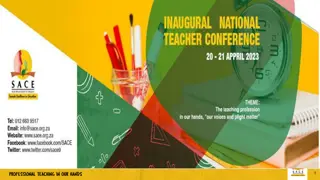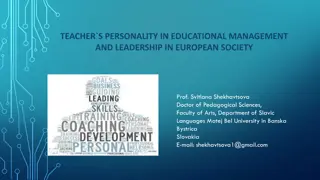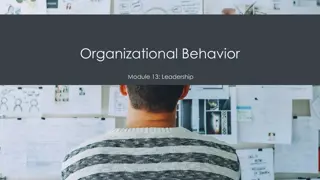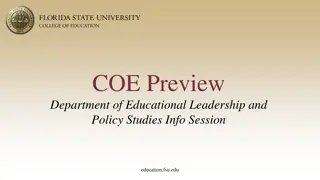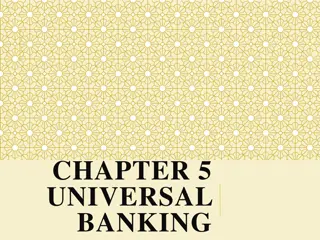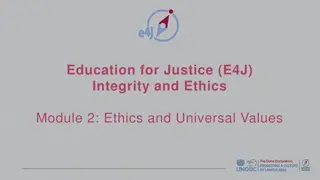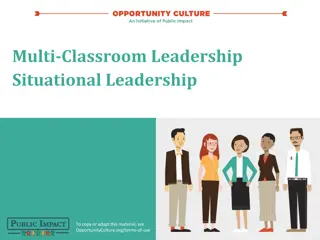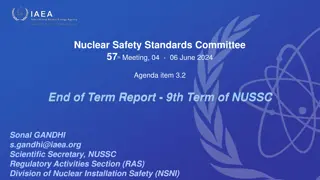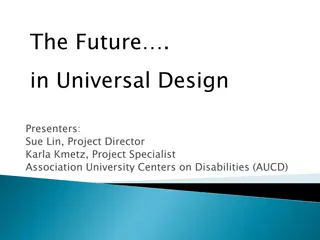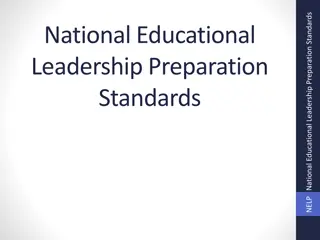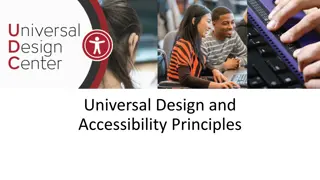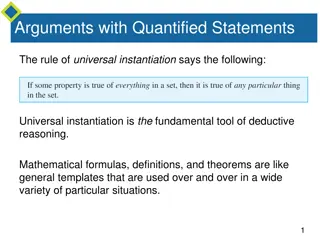Universal Leadership and Management Educational Standards
Strand 3 of the Universal Leadership and Management Educational Standards focuses on seven core areas including Leadership & Management, Strategy, Systems & Culture, Business & Risk, Technology & Data-Driven Decision Making, Developing Self & Others, Innovation & Transformation, Partnerships, and Working in Teams. It emphasizes strategic thinking, creating connections between work and citizen outcomes, and driving positive change through effective communication and collaboration.
Download Presentation

Please find below an Image/Link to download the presentation.
The content on the website is provided AS IS for your information and personal use only. It may not be sold, licensed, or shared on other websites without obtaining consent from the author. Download presentation by click this link. If you encounter any issues during the download, it is possible that the publisher has removed the file from their server.
E N D
Presentation Transcript
Strand 3 Universal Leadership and Management Educational Standards December 2021
Seven Core Areas: Leadership & Management Thinking and working strategically and systemically, leading and supporting as required to deliver locally, nationally and internationally, creating the connection between work and citizen outcomes. Respecting the unique drivers of culture and values across teams and organisations. Strategy, Systems & Culture (Purposeful)* Performance Balancing priorities; managing operations, finances, risks, experimentation and resources to deliver. Business & Risk Working in multidisciplinary teams and using digital technology to support citizen outcomes, building information and digital literacy, digital content creation, data strategy and planning, data analytics and visualisation. Using quantitative and qualitative data in the most effective way to problem solve, enabling robust, accountable, evidence-based decision making and delivery. Technology & Data Driven Decision Making (Considered)* Developing self and others for now and the future through self awareness and reflection. Creating a culture of learning to continuously grow and adapt to new, changing environments. Accountable for their own development and are proactive in the wider team s development and wellbeing as well as their own. Setting challenging development goals with the people they manage each year and the ability to show progress towards these goals. Developing Self & Others (Self Developing & Enabling)* People Driving and leading change through people by balancing what is known and controllable, facing uncertainty with positivity and curiosity having a growth mindset. Learning to anticipate, adapt and react to new and changing dynamics. Looking externally to bring in new ways of thinking and experimenting to drive and deliver positive citizen outcomes. Innovation & Transformation (Transformational)* Communicating Purposefully Communicating clearly and concisely, utilising different platforms and networks, appropriate to the audience. Creating connections between work and citizens' outcomes. Partnerships (Connected)* Working in Teams Creating an environment of inclusion, ownership, collaboration and support and wellbeing, including operating in hybrid and flexible working environments. (Inclusive)* 2 *Revised Leadership in Action attributes
Strategy, systems and culture Thinking and working strategically and systemically, leading and supporting as required to deliver locally, nationally and internationally, creating the connection between work and citizen outcomes. Respecting the unique drivers of culture and values across teams and organisations. Understands team objectives and delivers against them in a way that demonstrates understanding of relevant policies and procedures. Asks the right questions and connects with the right people to perform their role effectively. Seeks out feedback from peers and managers to further understand their responsibilities. Aware of some of the external factors that can impact delivery of their work and their own role in sustaining an inclusive, growth culture and how this links to team performance. LEVEL 1 Understands their role as part of a system of teams, departments and organisations that make up government. Understands how their team interacts with other teams and departments and looks for opportunities to work together to deliver improved service to customers. Stays up to date with changes to policies and procedures. Creates a culture of continuous learning and development by encouraging curiosity and self-awareness within the team. LEVEL 2 Understands the direct impact of their role on individuals and the system beyond their department and how it affects the culture that exists. Stays up to date with policy changes and equips colleagues with the appropriate guidance to successfully perform their roles. Maintains a network that facilitates quick access to deep subject matter expertise to support complex, interdepartmental projects. Recognises where strategy comes from, understands it and can identify and interpret the external factors that have implications for the CS. LEVEL 3 Balances the strategic needs of their business unit with the broader needs of the agency or department to deliver on objectives. Collaborates where appropriate to develop cohesion and understand how their work impacts more broadly on citizen outcomes. Coaches junior team members to recognise the significance of their own role within a wider organisation of teams and departments. Understands the importance of thinking strategically and implements their own strategy in line with wider CS strategies. LEVEL 4 Shapes their department or system s role and purpose in delivering civil service priorities which are in the national interest. Balances the complex political, national and international dynamics of government to focus on citizen outcomes, now and in the future. Applies a systems lens to strategy development, bringing the outside in through a network of internal peers and external stakeholders and those interrelationships from across public and private sector organisations. Demonstrates the leadership of strategy and critical systems thinking in a CS context. LEVEL 5 Engages with cross-departmental peers and senior colleagues to develop a cohesive approach to solving highly complex and interrelated national issues. Takes a systems leadership approach to find new ways to create value and impactful change and outcomes for citizens. Creates alignment with strategy across departments and agencies. Understands the different drivers and enablers of this culture and seeks to create a balance. Embeds a culture of continuous improvement and efficiency. LEVEL 6 Balances strategic priorities and the perspectives of the wider ecosystem to deliver locally, nationally and internationally from policy to delivery. Seamlessly switches roles between leading, supporting and challenging to create the right outcome for HM Government (HMG) and the citizens outcomes. Maintains a network of high-ranking officials in international governments and draws on these perspectives to influence and inform strategy at the most senior levels of HMG. Navigates trade offs between government priorities, the needs of its workforce and UK citizens to build a cohesive culture that enables excellent delivery of public services and supports the reform agenda. Understands the user experience from the citizen s perspective and tests out the services they are accountable for designing and implementing. LEVEL 7 3
Business and risk Balancing priorities; managing operations, finances, risks, experimentation and resources to deliver. Understands own workload and their role in supporting team projects. Accesses the tools and resources needed to deliver work effectively. Carries out work to an agreed standard and timeframe. Is open to and looks for opportunities to contribute to management processes to further develop their knowledge. Uses judgement to ask meaningful questions when issues relating to deadlines, quality and service might be apparent in operations. LEVEL 1 Develops the functional skills of managing a business through their work. Uses commercial awareness and sound judgement to connect financial decision-making with positive citizen outcomes. Understands own role in communicating financial risk to leadership. LEVEL 2 Aware of and proactively takes steps to mitigate financial, operational and change risks. Manages and deploys resources effectively. Communicates to leadership where investment is needed and how it will be used. Navigates the balance between minimum resources to deliver and the right skills required. LEVEL 3 Balances business as usual operations with experimentation and calculated risk to improve service and delivery. Has mastered broad T-shaped (breadth of understanding and depth of skill) skills related to the functional management of a business unit and coaches junior colleagues to develop these skills. Can identify and articulate significant potential risks in operations, such as budget and commercial, scope or resource and knows how to mitigate, escalate or when to seek advice on these. LEVEL 4 Can maximise resources, budgets and capabilities when making strategically significant decisions about projects. Identifies, analyses and makes judgements on the financial and operational risks of projects and summarises these findings to departmental leadership. LEVEL 5 Navigates the balance between finance, resourcing, operations, and risk to enable the department to deliver its objectives. Makes strategically significant decisions about highly complex programmes and projects with consideration for how this will impact across the system. Influences and informs ministers about potential risks and how these can be managed or mitigated. LEVEL 6 Evaluates the benefits and risks of very complex and strategically important initiatives on an international, national and local level. Makes informed recommendations to ministers and senior stakeholders on the operations of government. Scans external environment to anticipate and mitigate the risk of potential challenges from economic, environmental, social and political dynamics. LEVEL 7 4
Technology and data driven decision making Working in multidisciplinary teams and using digital technology to support citizen outcomes, building information and digital literacy, digital content creation, data strategy and planning, data analytics and visualisation. Using quantitative and qualitative data in the most effective way to problem solve, enabling robust, accountable, evidence-based decision making and delivery. Able to gather a range of information from different government sources and use it to identify problems and successes. Analyses, understands and presents data to peers and colleagues in a clear, efficient manner that supports decision-making processes. Confident with a variety of digital tools and technologies that enhance their work. LEVEL 1 Accurately analyses, understands and interprets data sets. Reviews and sorts information by relevance and importance. Recognises the value of both quantitative and qualitative data insights and the channels through which these can be gathered. Identifies gaps and inconsistencies in data sets and potential related risks. Uses digital tools and technologies to access and interpret data. Uses several different sources to gather information and interprets it correctly. Uses insights to inform own decision-making. Understands their role in the decision-making process and can support their manager by reflecting and challenging where appropriate. LEVEL 2 Makes complex data-driven decisions that have a tangible impact on citizen outcomes. Experiments with new technologies and digital platforms that can enhance the delivery of work or access to data. Critically analyses and interprets a wide variety of information from different sources and has confidence to use it to create a compelling argument. Gets the right stakeholders involved in complex decision making. Translates data into a set of high-level recommendations for senior colleagues and stakeholders and substantiates these with well-reasoned evidence and argument. LEVEL 3 Maintains a network of experts. Recognises patterns and connections between diverse sets of information, including from external sources, and can synthesise these into a best course of action. Recognises when new technology can improve processes or data flows, and looks for opportunities to integrate. Synthesises different sources of information to understand complex factors. Balances inaccurate or incomplete information in unpredictable contexts with what is known and controllable to decide on a course of action. Uses robust evidence to support decision making on highly complex projects and issues that have significant implications. LEVEL 4 Possesses strong conceptual knowledge of emerging trends around data analytics and new digital technologies. Scans the external environment to understand potential impacts of these trends on government. Is comfortable with incomplete or ambiguous sets of data and identifies when to take action, with consideration for potential risks. Credible, logical thinker who uses data and insights to mitigate the role of bias and assumptions in decision making. Collaborates with senior leaders to gain insights and understand the very complex issues they are trying to address. Synthesises data into insights and uses the right combination to communicate complex multi-layered issues and influence strategic stakeholders. LEVEL 5 Draws upon a range of qualitative and quantitative evidence to create compelling, robust arguments that influence and inform strategy and policy making at the most senior levels of government. Advocates for new and emerging technologies that enhance and improve decision making and delivery. Uses data to inform the direction of their department and to ensure value for money and citizen outcomes. Thinks through the wider impact of data-driven decisions and potential what if scenarios relating to benefits, risks and cost before committing to a course of action. Brings in the right experts who have access to a range of validated, trusted sources of information to make robust, bold and broad decisions on behalf of ministers. LEVEL 6 Executes appropriate judgement on when to interrogate data more deeply. Engages with comparable global governments and international organisations and is actively preparing for megatrends that will impact the future of public service at a national and local level. As the accounting officers for their department, they can make decisions based on the four tests of regularity, propriety, value for money and feasibility . Can craft influential and persuasive data-driven arguments to support decisions that directly impact on matters of international, national and local interest. Under scrutiny, can stay focused on citizen outcomes and can robustly support their decisions with accurate and validated data and insights. LEVEL 7 5
Developing self and others Developing self and others for now and the future through self awareness and reflection. Creating a culture of learning to continuously grow and adapt to new, changing environments. Accountable for their own development and are proactive in the wider team s development and wellbeing as well as their own. Setting challenging development goals with the people they manage each year and the ability to show progress towards these goals. Has regular conversations with their manager about the things they want to develop and what the organisation needs them to develop and sets goals to try to achieve them. Can reflect and recognise when they need to ask for help. Shares learning and new skills with their team and peers. Supports their management in achieving team goals. Can demonstrate judgement in asking for more information and seeks clarity by asking questions. LEVEL 1 Uses their internal peer network to test ideas, challenges and problems and share insights and experiences. Understands their impact on team performance. Coaches direct reports to manage high performing teams. Manages team effectively using CS management systems and processes. Delivers difficult feedback when needed, ensuring it is clear and meaningful. Open to receiving challenging feedback and encouraging questions. Creates development plans in collaboration with their team. Understands the fundamentals of performance management systems and tools. LEVEL 2 Uses their internal peer network to test ideas, challenges and problems and share insights and experiences. Understands their impact on team performance. Coaches direct reports to manage high performing teams. Manages team effectively using CS management systems and processes. Delivers difficult feedback when needed, ensuring it is clear and meaningful. Open to receiving challenging feedback and encouraging questions. Creates development plans in collaboration with their team. Understands the fundamentals of performance management systems and tools. LEVEL 3 Recognises the implications of working in an adaptive system. Looks to further their network with cross government and external peers. Leads with empathy and authenticity coaching their direct reports in leadership and management skills. Creates an environment of psychological safety that enables feedback, coaching and positive challenge and empowerment across the team. Shares their experiences and insights from their own development to support all members of the team identify a career pathway and spotting and supporting talent in their team. Develops their direct reports by delegating some of their responsibilities as appropriate. Has created a set of team values that reflect the departments and CS management systems and processes to enable high performance. Able to deliver and receive challenging feedback from senior officials and stakeholders. Demonstrates self-awareness and reflection regularly. LEVEL 4 Has a broad and diverse network of internal and external contacts and regularly contributes by sharing experiences. Maintains an achievement orientation, encouraging others to set and achieve goals. Takes a strategic approach to developing their direct reports, aligning department and broader government needs with the needs of the function or agency they lead. Looks for opportunities to mentor in other functions or agencies to share experiences and support knowledge sharing across the system. Coaches their direct reports to create lead and manage high performing teams. Able to deliver difficult or challenging feedback to other senior leaders and stakeholders confidently. Reflects and adapts team values to reflect the diversity of the team. LEVEL 5 Champions and creates a culture of learning in their department, where continuous learning is embedded at all levels. Takes an inspirational leadership approach to support and enable others, coaches direct reports to do the same. Role models a learning culture by looking across the government system, bringing in external insights and sharing experiences. Scans the horizon to identify emerging trends and how these will impact the skills and behaviours that will be required as an organisation. LEVEL 6 Committed to developing their own practice as a leader and seeks opportunities for feedback from senior stakeholders, peers and those they lead. Leads with influence and positivity coaching direct reports to do the same. Translates government vision and reform agenda into a learning strategy. Can connect and align the requirements to deliver internationally, nationally and locally with the needs of ministers and senior government officials to create high level, strategic learning plans. Forward thinking about development and scans the ecosystem to identify and plan for the skills needed for now and the future. LEVEL 7 6
Innovation and Transformation Driving and leading change through people by balancing what is known and controllable, facing uncertainty with positivity and curiosity having a growth mindset. Learning to anticipate, adapt and react to new and changing dynamics. Looking externally to bring in new ways of thinking and experimenting to drive and deliver positive citizen outcomes. Actively learns new processes, tools and procedures, looks for ways to improve them and supports their team to use them. Asks questions about change and is curious. Can take action in crisis or turbulent times and maintain their focus on excellent delivery. Open and positive to change and seeks to understand the benefits it will deliver. Asks questions to further their understanding and looks for opportunities to learn and develop new skills. Seeks perspectives from peers to improve processes. LEVEL 1 Supports direct reports to have a positive outlook on change and role models this in their own actions. Feels confident to ask their own leader about the changes that are being implemented, sharing the questions from their team and perspectives on how the change will impact on work and wellbeing. Assesses new technology and its usefulness in their team to drive transformation. Can assess the appropriate level of information to share with their team at the right time. Encourages experimentation and curiosity about the work they do to be more effective or efficient. Looks for ways to experiment with and implement new tools and technology and is confident in using them. Builds and maintains a strong network of peers to connect with to source ideas for their team. LEVEL 2 Understands the cumulative effect of change on the systems and provides guidance and leads people through periods of ambiguity and uncertainty. Communicates change with clarity and vision, connecting to purpose and citizen outcomes to inspire changes in behaviour. Creates an environment where people feel safe to share and process their feelings and questions. Positively and constructively challenges their leader on change when needed and feels confident that their questions will be heard. Creates an environment that encourages experimentation and is not afraid to fail. Looks for ways to implement new technology in the system. Actively scans the environment to identify and manage potential challenges. Respects what has come before, and drives improvement, innovation and transformation when needed. LEVEL 3 Can adapt and plan for change and transformation by scanning the environment, internally and externally. Implements strategic changes and supports their leader through constructive challenge. Connects with their network of senior leaders internally to understand how transformation is happening across the system and tries to apply learnings from their experiences. Uses storytelling/narrative as a technique to share change and inspire action. Accepts and manages ambiguity and uncertainty, understanding what is within their control and influence. Creates an environment of psychological safety for all ideas to be discussed openly, encouraging experimentation. Actively seeks external perspectives to understand leading practices and processes that might drive efficiency in delivery. Builds and uses their networks and knowledge of the external environment to actively plan for new and changing dynamics that can create complications. Can react, adapt and create opportunities to innovate in response to crisis. LEVEL 4 Enables their direct reports to navigate uncertainty and complexity by creating a space for challenge, discussion and questions to ensure change and transformation is understood. Partners with peers and experts to implement change, taking a systems perspective and ensuring the changes they implement impact positively across the system. Actively encourages sharing and learning from mistakes and considered risk taking. Constantly scans the environment to anticipate and get ahead of changes that could create very complex problems and have a significant impact. Looks internally to understand where innovation or improvements are happening and advocates for innovation. Uses lessons learned in crisis management to suggest new ways of system working. LEVEL 5 Looks for opportunities to get ahead of change, proactively planning and gathering the right expertise to tackle the very complex problems that might arise. Looks externally to understand how others are managing digital transformation and looks for ways to implement new technologies across the department to drive efficiencies. Supports ministers in how they can proactively work to transform the way they deliver and invest taxpayer funds, balancing public expectations with environmental dynamics. Approaches innovation with an entrepreneurial mindset, seeking to identify and leverage opportunities that could help to tackle very complex, strategically significant problems. Role models curiosity, experimentation and learning from mistakes. Uses a network of senior peers in international governments, wider public and private sector to access ideas which they champion to solve strategically important challenges of national or international importance. LEVEL 6 Drives a culture of change and continuous improvement across government by proactively scanning and planning strategic initiatives that positively transform and enable departments and agencies to deliver. Spots opportunities and anticipates change rather than reacting to it. Looks globally to anticipate changing dynamics that will impact citizens. Connects and collaborates with international and private sector peers to keep informed on change trends that will have significant impacts on the UK. Uses awareness of global events and trends to proactively develop strategies for averting national crises. Resilient and focused on citizen outcomes. Uses innovation as a tool to solve some of the most strategically complex and significant challenges faced in the UK. Uses the positive lessons that can emerge from crisis to reform or improve ways of working to deliver impactful results. LEVEL 7 7
Communicating purposefully Communicating clearly and concisely, utilising different platforms and networks, appropriate to the audience. Creating connections between work and citizens' outcomes. Expresses themselves clearly in written, verbal and visual form being mindful of inclusivity. Comfortable using a wide variety of communications platforms. Can disseminate information to their team quickly and efficiently, using the right tools. Confident using technology to communicate when working remotely. Understands how their work impacts positively on citizens. Demonstrates curiosity about their own personal purpose and values and how these align to professional objectives. Understands their role in the team and is curious about how to work together and support each other. LEVEL 1 Regularly considers and consults with experts to support complicated messaging. Uses language that creates impact but is understood. Identifies when to adapt communication style to different situations and stakeholders. Confidently shares messages with the right tool or platform for the audience. Communicates and listens with empathy creating a safe environment for challenge. Creates compelling arguments to influence or direct activity. Delivers difficult feedback when needed, ensuring it is clear and meaningful. Can articulate their own personal purpose and values and consistently demonstrates these through their work and professional relationships. Creates awareness of purpose within the team and its role in bringing this to life for customers and citizens. LEVEL 2 Recognises when to partner with experts to build compelling communications. Confidently communicates complicated, strategic information to a range of stakeholders. Looks for ways to balance communications strategies with business needs and tolerance. Briefs ministers and external stakeholders using clear and compelling communications. Articulates arguments to influence actions. Able to deliver constructive feedback to a variety of stakeholders, conveying the message with respect. Stays connected to the citizens and/or service users to understand how their work creates a positive impact for citizens. Shares these perspectives with leadership to help shape strategy and policy making. LEVEL 3 Partners with the right experts to deploy important, strategic information into a department or system. Regularly briefs senior officials, ministers, stakeholders and media on complex issues and acts as an ambassador for their department. Articulates communications persuasively to drive activity or influence decision making. Able to deliver challenging feedback to senior stakeholders and receive it. Communicates a clear and compelling vision of the role their function plays in driving better citizen outcomes. Actively listens and uses storytelling/narrative techniques to inform and influence colleagues. Creates psychological safety that enables colleagues to connect personal values and purpose to the wider organisation. LEVEL 4 Partners with the right experts to create compelling communications strategies across multiple divisions, with multiple channels and stakeholders. Creates briefing documents, statements or media updates using accurate information. Regularly briefs ministers and media and internal/external stakeholders on controversial, complex or novel issues. Able to deliver difficult or challenging feedback to other senior leaders and stakeholders confidently. LEVEL 5 Creates an inspiring future vision for the department, function or profession. Partners with senior experts to balance department and government needs when delivering critical strategic messages. Can communicate a compelling vision. Leads on communications on the most complex and high-profile issues internally and externally. Regularly communicates with ministers, media and other external groups to inform, update or engage on action or activity. Cultivates and maintains relationships at a ministerial level. Role-models purpose-driven leadership and shares their connection to departmental purpose with authenticity and vulnerability. LEVEL 6 Navigates, creates and delivers extremely complex and significant messaging and communication on topics that are of global, national or strategic importance. Can adapt, align and connect complex, disparate or controversial content into a coherent message, appropriate for the audience. Initiates, cultivates and sustains productive relationships with ministers. Advocates a focus on purpose with stakeholders, ministers and direct reports. LEVEL 7 8
Working in teams* Creating an environment of inclusion, ownership, collaboration, support and wellbeing, including operating in hybrid and flexible working environments. Reflects on the information or content they source or receive to make sure it is accurate. Takes ownership for the things they need to deliver. Understands the importance of seeking and hearing other opinions and actively seeks different opinions and perspectives on how to deliver. Builds effective relationships with team members to get to know them and how they like to work. Feels included and valued. LEVEL 1 Takes accountability for their work streams or projects with oversight from their manager. Brings in diverse perspectives when making decisions to challenge biases and gain broad insights. Understands the importance of working in teams and how to motivate and empower colleagues to create that environment of inclusion. Support the wellbeing needs of the team and understand reasonable adjustments. LEVEL 2 Encourages discussion and values different perspectives that challenge bias and assumptions and creates a safe environment to enable this Practices inclusive leadership by creating a culture based on trust and respect, allowing for challenge and questions to shape the culture. Understands the skills within the team and what motivates colleagues to deliver. Role models flexible working and actively supports wellbeing of the team. LEVEL 3 Creates an environment where challenge and questions are encouraged creating diversity of thought with colleagues at all levels. Holding themselves and their direct reports to account for the decisions they make and delivering through others. Promotes diversity and authenticity as key drivers of an inclusive culture. Role models flexible working and actively supports wellbeing of the team. LEVEL 4 Meets the diverse needs of all stakeholders, recognising the inherent complexities within different groups and seeks to create tolerance and shared perspectives. Embeds a culture of inclusion where the diverse perspectives of all employees are valued, respected and leveraged. Creates an environment where information is shared openly, and the right people are engaged for critical decision making. LEVEL 5 Enabling workplace transformation to ensure a diverse and inclusive environment exists. Realises the breadth of diversity within the organisation. Works to create an environment that fosters a sense of inclusion along known dimensions of diversity (e.g. gender, ethnicity). Is able to understand others perspectives and experiences when brought to their attention. LEVEL 6 LEVEL 7 Leading the holistic transformation of the workplaces they are responsible for into one which is a diverse and inclusive environment. *Will need to be reviewed where appropriate to align with the inclusion standards/practitioner expectations 9
Levels/Grades/Programmes* Creating an environment of inclusion, ownership, collaboration and support, including operating in hybrid working environments. Personal effectiveness(1) LEVEL 1 ( AA/AO) Reflects on the information or content they source or receive to make sure it is accurate. Takes ownership for the things they need to deliver. Understands the importance of hearing other opinions. Actively seeks different opinions and perspectives on how to deliver. LEVEL 2 (EO/HEO) Takes accountability for their work streams or projects with oversight from their manager. Brings in diverse perspectives when making decisions to challenge biases and gain broad insights. Foundation (2) LEVEL 3 (SEO/G7) Encourages discussion and values different perspectives to challenge bias and assumptions. Practices inclusive leadership by building a climate of trust and respect, allowing for challenge and questions to shape the culture. Practitioner (3) LEVEL 4 (G6-SCS 1) Creates an environment where challenge and questions are encouraged, holding themselves and their direct reports to account for the decisions they make. Promotes diversity and authenticity as key drivers of an inclusive culture. Senior Practitioner (4) Meets the diverse needs of all stakeholders, recognising the inherent complexities within different groups and seeks to create tolerance and shared perspectives. Embeds a culture of inclusion where the diverse perspectives of all employees are valued, respected and leveraged. Creates an environment where information is shared openly, and the right people are engaged for critical decision making. LEVEL 5 (SCS 2) Enabling workplace transformation to ensure a diverse and inclusive environment exists. Realises the breadth of diversity within the organisation. Works to create an environment that fosters a sense of inclusion along known dimensions of diversity (e.g. gender, ethnicity). Is able to understand others perspectives and experiences when brought to their attention. LEVEL 6 (SCS 3) Executive (5,6,7) LEVEL 7 (SCS 4) Leading the holistic transformation of the workplaces they are responsible for into one which is a diverse and inclusive environment. 10 *Further work needed to link these where appropriate to the inclusion standards/practitioner expectations



